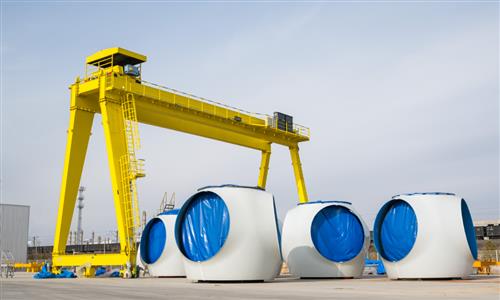
Shanghai's Yangshan Deep-Water Port on January 1, 2025. Photo: VCG
Japanese carmaker Toyota's recent plan to build its first wholly-owned electric vehicle (EV) manufacturing plant in Shanghai has attracted broad attention. US electric car producer Tesla's Megapack energy storage plant also passed its completion inspection recently.
These foreign companies' expanding investments in this nation underscore growing foreign investor confidence in China's economic and market stability. Other Japanese vehicle makers and the entire Japanese car industry cannot ignore the Chinese market.
Toyota's decision to establish a wholly-owned EV plant in China is influenced by several key factors. Firstly, the success of Tesla's Shanghai Giga-factory cannot be overlooked.
In 2019, Tesla established its first overseas Giga-factory in Shanghai, achieving rapid progress in plant construction, factory completion, and vehicle production all within the same year, and it has since expanded its production capacity multiple times. Thanks to lower manufacturing cost, Tesla cars have received positive market feedback. Obviously, Toyota aspires to replicate Tesla's success story in Shanghai.
Secondly, China's proactive measures to open up its massive market influenced Toyota. In recent years, China has meted out effective policies to promote new-energy vehicle manufacturing, the EVs in particular. The moves include the removal of foreign ownership limits on passenger car manufacturing and the restrictions on foreign companies establishing more than two joint ventures to produce similar vehicle products in the country. Also, China has been lowering import tariffs on automobiles, bolstering the attractiveness of its investment climate for global automakers.
The Central Economic Work Conference in December emphasized the need to expand high-level opening-up and keep foreign trade and foreign investment stable. The higher-standard opening-up policies have boosted foreign investor enthusiasm and the market vitality, providing fertile ground for Toyota to establish a wholly-owned EV factory in China.
Thirdly, the Chinese market and investment environment continue to improve. In the face of growing uncertainties surrounding industrial and supply chains, China, with its favorable business environment and huge market potential, has become a popular destination for foreign enterprises seeking to avoid supply chain disruptions.
In the foreseeable future, it will be difficult to expand an automotive market at such a massive scale. Toyota's plan to set up a wholly-owned EV factory in Shanghai underscores China's appeal as a prime investment destination, and it also serves as a symbol for Toyota to put in more investments and reap the dividends in China's huge market.
Fourthly, the continuous upgrading of China's automotive industry supply chain and research capability aligns closely with Toyota's strategic goal for developing high-end EVs.
China's production capacity for new-energy vehicles accounts for about 70 percent of the global total, backed up with a full-fledged industrial support system and supply chain for the EV industry. Car designing, manufacturing, style, functionality, technological innovation and more have together built up the advantages of China's EV industry.
Leveraging the strong capability of China's industrial supply chain, and relying on Shanghai as a trade and economic center to create an efficient business model targeting both the Chinese and the global market will be a crucial part of Toyota's plan.
The climate change issues have prompted many countries to discuss stricter management on fossil fuel powered cars, and the market response has driven the global automotive industry to embark on the green transformation.
As China continues to open its door wider, the country's market is set to remain a magnet for high-quality foreign investment, and Chinese EVs will continue to provide green momentum for global carbon reduction efforts.
The author is a veteran automobile industry observer. bizopinion@globaltimes.com.cn



